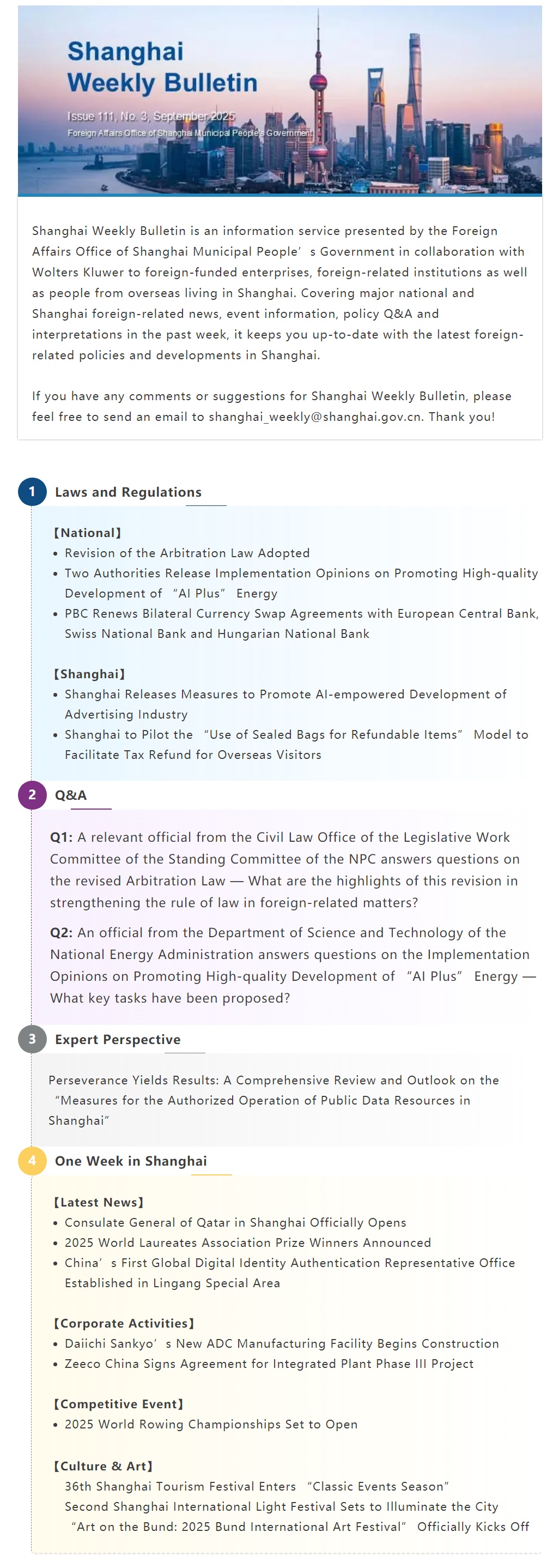Shanghai Weekly Bulletin (Issue 111 No.3, September 2025) ( 2025.09.17 )

Laws and Regulations
National
1.Revision of the Arbitration Law Adopted
[Keywords: Arbitration law]
On September 12, the 17th session of the Standing Committee of the 14th National People’s Congress (NPC) voted to adopt the revised Arbitration Law. It clearly stipulates that, in line with the needs of economic and social development as well as reform and opening-up, foreign arbitration institutions may, in accordance with relevant state regulations, establish business offices in designated areas such as pilot free trade zones approved by the State Council and the Hainan Free Trade Port, to conduct foreign-related arbitration activities. The new Arbitration Law will come into effect on March 1, 2026.
Source: Website of the NPC
http://www.npc.gov.cn/npc/c2/c30834/202509/t20250912_447762.html
2.Two Authorities Release Implementation Opinions on Promoting High-quality Development of “AI Plus” Energy
[Keywords: AI Plus, Energy]
Recently, the National Development and Reform Commission and the National Energy Administration (NEA) released the Implementation Opinions on Promoting High-quality Development of “AI Plus” Energy. The document focuses on aligning foundational capacity supply with industry application demands and sets out a series of key tasks in areas such as application scenario empowerment and key technology supply. It also specifies, in dedicated sections, the priority directions of R&D and application. The document further proposes that by 2030, AI technologies and applications dedicated to the energy sector should reach a world-leading level.
Source: NEA
https://www.nea.gov.cn/20250908/8a90bf7f17b141038fe7be0988a2c603/c.html
3.PBC Renews Bilateral Currency Swap Agreements with European Central Bank, Swiss National Bank and Hungarian National Bank
[Keywords: Europe, Switzerland, Hungary]
The People’s Bank of China (PBC) renewed bilateral currency swap agreements with the European Central Bank, the Swiss National Bank, and the Hungarian National Bank respectively on September 7 and 8. The scale of the bilateral currency swap agreement between PBC and the European Central Bank is set at RMB 350 billion / EUR 45 billion, with a validity of three years. The agreement between China and Switzerland amounts to RMB 150 billion / CHF 17 billion, valid for five years. Meanwhile, the agreement between China and Hungary totals RMB 40 billion / HUF 1.9 trillion, also valid for five years.
Source: PBC
http://www.pbc.gov.cn/goutongjiaoliu/113456/113469/5832835/index.html
Shanghai
1.Shanghai Releases Measures to Promote AI-empowered Development of Advertising Industry
[Keywords: AI, Advertising]
Recently, the Shanghai Municipal Administration for Market Regulation released the Several Measures of Shanghai to Support AI-empowered Innovative Development of the Advertising Industry. The document covers 12 key areas, including support for production factors, talent cultivation, ecosystem clustering, application scenarios, and intellectual property rights protection. It aims to promote the empowerment of the advertising industry through AI technologies and accelerate the development of Shanghai into an “International Hub for Digital Advertising”.
Source: Shanghai Municipal Administration for Market Regulation
https://scjgj.sh.gov.cn/207/20250908/2c984ad6992704e90199272ca91b0350.html
2.Shanghai to Pilot the “Use of Sealed Bags for Refundable Items” Model to Facilitate Tax Refund for Overseas Visitors
[Keywords: Tax-refund-upon-departure, Use of sealed bags for refundable items]
Recently, the Shanghai Municipal Commission of Commerce and Shanghai Customs jointly released the Notice on Piloting the “Use of Sealed Bags for Refundable Items” Model to Facilitate Tax Refund upon Departure for Overseas Visitors. The document proposes that overseas visitors who purchase tax-refundable goods at designated pilot stores in Shanghai and depart from Shanghai ports may opt for the “use of sealed bags for refundable items” facilitation model.
Source: Shanghai Municipal Commission of Commerce
https://sww.sh.gov.cn/zwgkgfqtzcwj/20250910/155973bcb850434ebb5b08a301d06563.html
Q&A
A relevant official from the Civil Law Office of the Legislative Work Committee of the Standing Committee of the NPC answers questions on the revised Arbitration Law
Q1
What are the highlights of this revision in strengthening the rule of law in foreign-related matters?
A1
The arbitration system is an important component of the rule of law in foreign-related matters. This revision of the Arbitration Law fully implements the important instructions of General Secretary Xi Jinping on arbitration work and the plans of the CPC Central Committee. It actively aligns with internationally accepted rules such as the UNCITRAL Model Law on International Commercial Arbitration, and makes the following key improvements to the legal framework for foreign-related arbitration.
First, the revision aligns with internationally accepted practices by introducing the “seat of arbitration” system. It clarifies that, unless the parties have otherwise agreed on the applicable law of the arbitration proceedings, the seat of arbitration shall be the basis for determining the applicable law of the arbitration proceedings and the court with jurisdiction. The revision also specifies the rules for determining the seat of arbitration. Where the parties have not agreed on the seat or the agreement is unclear, the seat shall be determined according to the arbitration rules chosen by the parties. If the arbitration rules do not provide for this, the arbitral tribunal shall determine the seat based on the circumstances of the case and in line with the principle of facilitating dispute resolution.
Second, the revision clarifies that in foreign-related maritime disputes, or in disputes between enterprises established and registered in pilot free trade zones approved by the State Council, the Hainan Free Trade Port, or other areas designated by the state, the parties may choose, outside of arbitration institutions, to have the case arbitrated by an arbitral tribunal composed of individuals who meet the conditions set forth in the Arbitration Law, in accordance with the agreed arbitration rules. At the same time, the revision establishes a filing system for such arbitrations, stipulating that the arbitral tribunal shall, within three working days after its formation, file the names of the parties, the seat of arbitration, the composition of the arbitral tribunal and the arbitration rules with the Arbitration Association. In addition, the revision adds provisions on preservation measures in such arbitrations. It specifies that where a party applies for property preservation, evidence preservation, or requests that the other party be ordered to perform certain acts or be prohibited from certain acts, the arbitral tribunal shall, in accordance with the law, submit the application to the people’s court, which shall handle it promptly in accordance with the law.
Third, the revision supports arbitration institutions in strengthening international exchanges and cooperation. A new provision has been added to the “General Provisions”, stating that the state encourages arbitration institutions to enhance engagement with foreign arbitration bodies and relevant international organizations, and to actively participate in the formulation of international arbitration rules.
Fourth, the revision promotes both the “going global” and “bringing in” of arbitration institutions. It expressly supports Chinese arbitration institutions in establishing business offices overseas and carrying out arbitration activities. At the same time, in line with the needs of economic and social development as well as reform and opening-up, foreign arbitration institutions are allowed, in accordance with relevant state regulations, to set up business offices and conduct foreign-related arbitration activities in pilot free trade zones approved by the State Council, the Hainan Free Trade Port, and other designated areas.
Fifth, the revision makes clear that arbitration institutions and tribunals may, in accordance with relevant international investment treaties and agreements providing for the submission of investment disputes to arbitration, handle international investment arbitration cases under the arbitration rules agreed by the parties.
Sixth, the revision aligns with the provisions of the Civil Procedure Law on judicial assistance. It sets out detailed rules on the recognition and enforcement of arbitral awards, including applications to foreign courts for recognition and enforcement of effective arbitral awards rendered within China, and applications to people’s courts in China for recognition and enforcement of effective arbitral awards rendered outside China.
Source: People’s Court Daily
An official from the Department of Science and Technology of the National Energy Administration answers questions on the Implementation Opinions on Promoting High-quality Development of “AI Plus” Energy
Q2
What key tasks have been proposed?
A2
The document focuses on aligning foundational capacity supply with industry application demands, and sets out a series of key tasks in areas such as application scenario empowerment and key technology supply. It also specifies, in dedicated sections, the priority directions of R&D and application.
First, the document promotes all-round empowerment across energy scenarios. It systematically outlines the deployment of AI in eight major application scenarios across different energy sources — coal, electricity, oil, and gas. These scenarios include: “AI + power grid”, new business models for energy, new energy, hydropower, thermal power, nuclear power, coal, and oil & gas. These efforts aim to ensure that the energy sector shares the dividends of AI development, facilitate the digital and intelligent transformation of traditional fossil energy industries, and accelerate the deep integration of AI with new energy, new business models for energy, and cross-disciplinary energy fields, thereby fostering the growth of new industries and models in the energy sector. Vertically, the document emphasizes the application of AI across the entire energy value chain, from equipment manufacturing, energy production, transmission, and dispatching to end-use consumption. By doing so, AI will play a stronger role in enhancing quality and efficiency in energy production, supply, storage, and distribution, and help raise the overall efficiency of the energy system.
Second, the document defines, in dedicated sections, clear development pathways for typical scenarios. Adhering to the principle of combining strategic guidance with precise implementation, the document focuses on areas with urgent needs for intelligent transformation, solid data foundations, clear application value, and strong potential for large-scale deployment. In dedicated sections, the document identifies 37 key tasks for the integrated development of “AI + energy”, covering over 100 scenarios. These include six in the oil and gas sector; five each in coal, power grids, hydropower, and new business models for energy; four each in thermal power and new energy; and three in nuclear power. For each task, the document also outlines specific development pathways and targets.
Third, the document aims to strengthen the supply of key generic technologies. Focusing on data, computing power, and algorithms, the document calls for the establishment of a systematic support framework for AI applications. It identifies three key areas for technological breakthroughs: (1) strengthen the data foundation by accelerating the development of high-quality datasets in the energy sector and ensuring the security and reliability of energy data throughout the entire process; (2) enhance support for computing power by strategically planning resources to build an integrated system where computing power and electricity are deeply coordinated; and (3) improve foundational model capabilities by driving deeper integration of AI with energy sector software and accelerating breakthroughs in green and low-carbon AI technologies.
Source: Website of the Chinese Government
https://www.gov.cn/zhengce/202509/content_7040257.htm
Expert Perspective
Perseverance Yields Results: A Comprehensive Review and Outlook on the “Measures for the Authorized Operation of Public Data Resources in Shanghai”
By Wan Bo (Boss & Young Law Firm)
[Continued from the Previous Issue]
III. Policy Recommendations for Improving the Measures
In our view, the Measures may be further refined from two dimensions: driving implementation through scenario-based applications, and enabling rapid institutional iteration. For example:
On the data supply side, it is recommended to compile a Catalogue of Authorized Operations for Public Data in Shanghai, which, in line with the principle of “scenario-driven” development, will identify priority areas for authorized operations, specify which data may be authorized for operation, determine appropriate authorization methods, and outline the expected value to be generated. For instance, in the field of medical big data, which offers abundant application scenarios, it is advised that the Shanghai Municipal Health Commission should expedite the release of the Guidelines on Strengthening the Security and Authorized Operation of Health Data in Shanghai. This will accelerate the practical implementation of authorized operations for public data in the healthcare field.
On the data utilization side, it is advisable to clearly define the entry thresholds for operating entities and development entities, including specific indicators such as capital strength, technological capability, security qualifications, and application scenarios. The List of Rights and Responsibilities of Authorized Operation Participants should be further refined to set out, in tabular form, the rights, obligations, and prohibited conduct of implementation agencies, operating entities, and development entities. In particular, it should detail the responsibilities for data security management and rules on profit attribution, in order to stabilize market expectations and expand the pool of entities engaged in data utilization.
On the platform side, it is important to promptly define technical standards and contract templates for Shanghai’s public data authorization and operation platform. Standards should be unified in areas such as data quality (accuracy, completeness, timeliness), technical security (encryption algorithms, access control), process norms (application, approval, delivery), product requirements (standardized interfaces, metadata descriptions), and legal documents (model texts for operating agreements and development agreements). The formulation of the standards should engage leading enterprises in the industry as well as professional technical and legal institutions to ensure that the standards are both industry-leading and practical.
One Week in Shanghai
Latest News
1.Consulate General of Qatar in Shanghai Officially Opens
[Keyword: Qatar]
On September 5, the Consulate General of Qatar in Shanghai held its official opening ceremony.
Source: Foreign Affairs Office of the Shanghai Municipal People’s Government
2.2025 World Laureates Association Prize Winners Announced
[Keywords: World Laureates Association Prize]
On September 10, the 2025 World Laureates Association (WLA) Prize winners were announced in Lingang. The WLA Prize in Computer Science or Mathematics was conferred upon Richard Schoen, professor emeritus at Stanford University’s School of Humanities and Sciences. Scott D. Emr, professor emeritus of molecular biology and genetics at Cornell University, and Wesley I. Sundquist, distinguished professor and chair of the Department of Biochemistry at the University of Utah shared the WLA Prize in Life Science or Medicine.
Source: Jiefang Daily
https://www.jfdaily.com/staticsg/res/html/journal/detail.html?date=2025-09-11&id=459963&page=01
3.China’s First Global Digital Identity Authentication Representative Office Established in Lingang Special Area
[Keywords: Digital identity authentication]
Recently, with the approval of relevant authorities, the Global Legal Entity Identifier Foundation (GLEIF), a leading international organization in the field of digital identity, officially established its China Representative Office in the Yangshan Special Comprehensive Bonded Zone in the Lingang Special Area. The representative office will engage in business promotion, marketing, research and information exchanges related to the Global Legal Entity Identifier (LEI) and Verifiable LEI (vLEI) to support the acceleration of digital transformation in shipping and trade.
Source: Lingang Special Area
Corporate Activities
1.Daiichi Sankyo’s New ADC Manufacturing Facility Begins Construction
[Keywords: Daiichi Sankyo]
Recently, Daiichi Sankyo China, a globally renowned pharmaceutical company, began construction of its new Antibody-Drug Conjugate (ADC) manufacturing facility in Zhangjiang, with a total investment of approximately RMB 1.1 billion. The new plant will adopt a cross-border segmented production model, focusing on high value-added production processes in Pudong. It not only ensures effective alignment between global technologies and domestic needs, but also stands as a best practice of China’s institutional opening-up in the biopharmaceutical sector.
Source: Pudong Release
2.Zeeco China Signs Agreement for Integrated Plant Phase III Project
[Keyword: Zeeco]
Recently, Zeeco China, a wholly owned subsidiary of Zeeco, a global leader in designing and manufacturing advanced combustion and environmental solutions, signed an agreement for its integrated plant phase III project in the Shanghai Bay Area High-tech Industrial Development Zone. The project plans to invest RMB 110 million to build a 22,000-square-meter high-standard factory building covering an area of approximately 48 mu.
Source: Shanghai Jinshan
Competitive Event
1.2025 World Rowing Championships Set to Open
[Keywords: World Rowing Championships]

The 2025 World Rowing Championships will take place from September 21 to 28 on Dianshan Lake in Qingpu. This year’s event is more than just a premier global platform for rowing competitions. It also aims to transform the excitement of the competition into increased consumer spending, further amplifying the mutually reinforcing effect between international sporting events and regional development.
Source: Shanghai Sports
Culture & Art
1.36th Shanghai Tourism Festival Enters “Classic Events Season”
[Keywords: Shanghai Tourism Festival, Classic Events Season]
On September 1, the 36th Shanghai Tourism Festival entered its Classic Events Season, which is scheduled to run through October 6. Centered on six major themes — City Tour, Shopping Tour, Cultural and Museum Tour, Traditional Chinese Style Trendy Tour, Online Tour, and Rural Fun Tour — the festival will present more than 200 high-quality, distinctive events and offerings carefully curated for both residents and visitors.
Source: Shanghai Release
2.Second Shanghai International Light Festival Sets to Illuminate the City
[Keywords: Shanghai International Light Festival]

The second Shanghai International Light Festival will be held from September 19 to October 18 under the theme “Light Up Shanghai”. This year’s festival will feature one main venue and 16 sub-venues, hosting a total of 177 themed activities. It will offer both domestic and international visitors, as well as local residents, an immersive experience and a full audio-visual feast of light and shadow.
Source: International Services Shanghai
https://english.shanghai.gov.cn/en-Latest-WhatsNew/20250819/96d5bf6827c64909a9ef9c5a9877a40e.html
3.“Art on the Bund: 2025 Bund International Art Festival” Officially Kicks Off
[Keywords: 2025 Bund International Art Festival]

On September 11, the Art on the Bund: 2025 Bund International Art Festival officially kicked off. Under the theme “To the Bund, For Art”, the festival will run until November 26, spanning the entire golden autumn season. It invites citizens and visitors to immerse themselves in art, stroll along the Bund, and experience the unique charm of Shanghai’s Haipai culture.
Source: Shanghai Huangpu